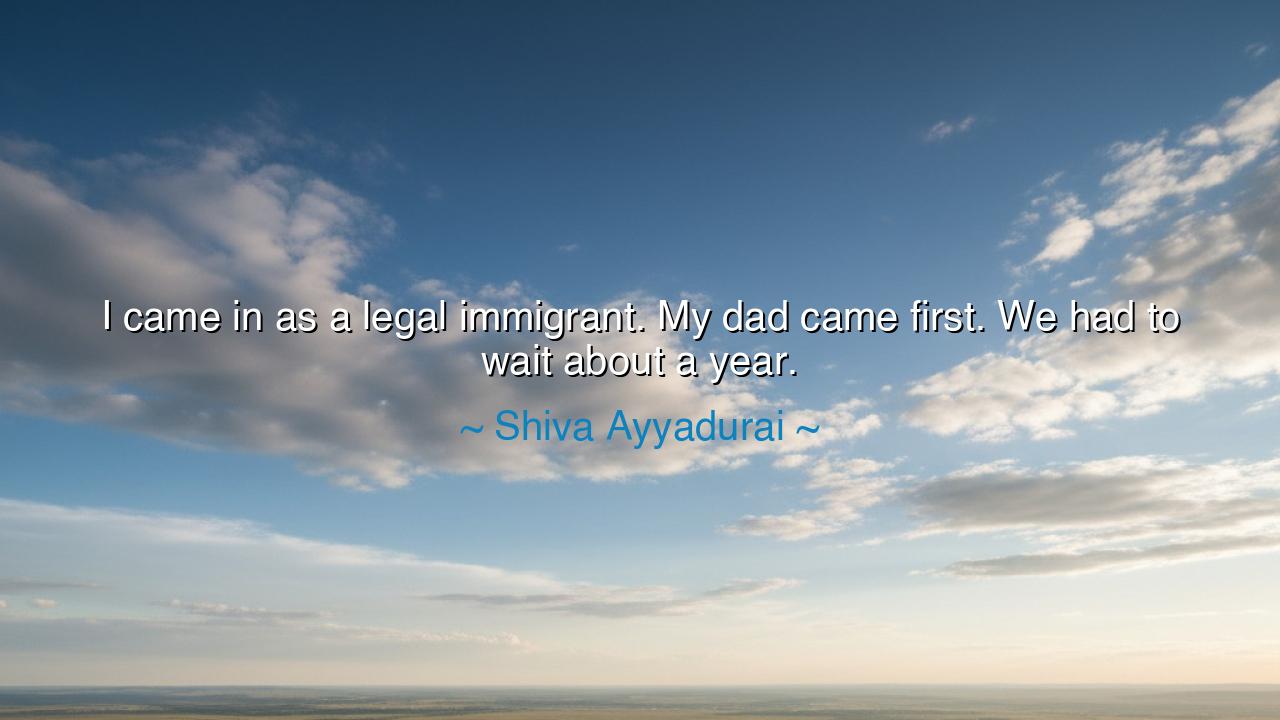
I came in as a legal immigrant. My dad came first. We had to wait






When Shiva Ayyadurai said, “I came in as a legal immigrant. My dad came first. We had to wait about a year,” he spoke not merely of a personal journey, but of an eternal truth about patience, discipline, and the sacred virtue of doing things the right way. His words, simple yet profound, carry the quiet dignity of those who build their lives not on shortcuts or privilege, but on perseverance and law. Beneath their plainness lies a story older than nations themselves — the story of the traveler who leaves home to seek a better life, and the family that waits, believing that sacrifice and patience will open the gates that force cannot. His statement is not only about immigration, but about honor, about choosing the harder path because it is just.
In the style of the ancients, one might say that Ayyadurai spoke as a son of order in a world seduced by haste. The ancients revered the virtue of patience — that slow, deliberate strength by which mountains are moved and civilizations are built. When he says his family “waited about a year,” he speaks of that sacred waiting, where hope and restraint are intertwined. It is a reminder that greatness is not seized but earned; that freedom, when won lawfully, carries a different weight in the heart. For lawful entry is not merely a passage of paperwork — it is a covenant of respect between the seeker and the land he enters, between the dream and the discipline that makes the dream possible.
The origin of this quote lies in Ayyadurai’s own journey from India to the United States, where his father first came to establish a foundation before bringing his family across. It is the story of countless immigrant families — men and women who endure the ache of distance and the long bureaucracy of permission, all for the promise of opportunity bound by law. Ayyadurai, later known for his contributions to science, technology, and public life, did not forget the road that led him there. By emphasizing the word “legal,” he draws a distinction not of arrogance, but of principle — that freedom must be built upon justice, and that even those who dream must honor the rules that guard the dream for all.
This struggle is not new. Across history, the path of migration has always been lined with longing and sacrifice. Consider the story of Andrew Carnegie, who came from Scotland to America as a boy, his family poor but lawful in their journey. Through honesty and unyielding labor, he rose to become one of the greatest industrialists in history. He, too, carried that immigrant’s pride — the knowledge that what he had gained was not stolen nor given, but earned through rightful means. Like Ayyadurai’s family, the Carnegies came with hope tempered by patience, and their story became part of the nation’s greatness. Such stories remind us that legality is not a barrier to progress, but the discipline that gives progress its lasting shape.
Ayyadurai’s words also contain an unspoken wisdom about family and faith. His father came first — as so many fathers do — to prepare the way, to bear the hardship alone so that others might live better. The waiting year was not a time of idleness, but of unseen love and endurance, a test of the family’s unity and belief. In this, we glimpse the universal rhythm of migration: departure, waiting, reunion. Every immigrant family becomes a symbol of the human condition — the journey from uncertainty to belonging, from exile to home. And through that journey, they teach us that laws and love are not enemies, but allies in the building of a just and compassionate world.
In a deeper sense, Ayyadurai’s reflection is a defense of order amidst chaos. In times when nations are divided over borders and belonging, his words remind us that law is not cruelty, but a structure that preserves fairness for all. To enter lawfully is to affirm one’s belief in justice — to say, “I will not take what is not yet mine, but will earn the right to belong.” The ancients would have honored such restraint, for they knew that the strength of a people lies not in how fast they move, but in how faithfully they uphold their principles. In a world eager for shortcuts, Ayyadurai’s story is a beacon of integrity.
The lesson his words offer is clear: respect the process that upholds justice, even when it tests your patience. In all things — whether it be love, success, or freedom — what is rushed is often fragile, but what is earned through perseverance endures. The true measure of a person is not how quickly they reach their destination, but how honorably they travel the road. To those who seek a new beginning, let this truth be your guide: follow the law not because it is easy, but because it is right. For law is not the enemy of freedom; it is the guardian that makes freedom possible.
So let future generations remember this: the strength of a nation, like the strength of a soul, is built by those who walk in patience, honor, and obedience to truth. To wait one year in righteousness is better than to arrive one day in deceit. The gate that opens with integrity leads not only to a new country, but to a higher form of freedom — one that no border, no time, and no trial can take away.






AAdministratorAdministrator
Welcome, honored guests. Please leave a comment, we will respond soon